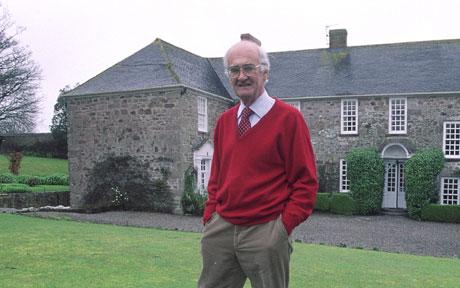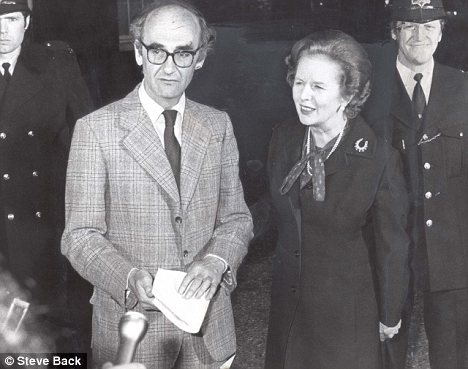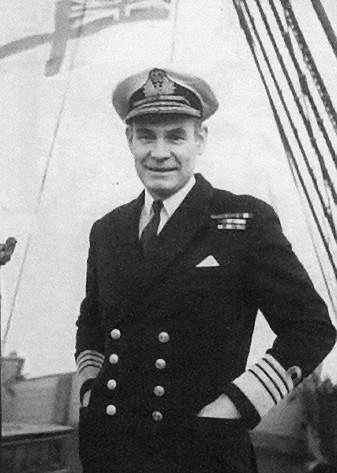<Back to Index>
- Secretary of State for Defence John William Frederic Nott, 1932
- Chief of the Defence Staff Admiral of the Fleet Terence Thornton Lewin, 1920
PAGE SPONSOR

Sir John William Frederic Nott (1 February 1932, Bideford, Devon) is a former British Conservative Party politician prominent in the late 1970s and early 1980s. He featured heavily in the public eye as Secretary of State for Defence during the Argentine invasion of the Falkland Islands and the subsequent Falklands War.
The son of Richard Nott and Phyllis née Francis, Nott was educated at Bradfield College and was commissioned as a regular officer in the 2nd Gurkha Rifles in Malaysia (1952 - 1956). He left to study law and economics at Trinity College, Cambridge, where he was President of the Cambridge Union Society. At Cambridge he met his future wife Miloshka, herself a refugee from Communist Slovenia (Yugoslavia). They had two sons and a daughter.
Nott was Member of Parliament for St Ives in Cornwall from 1966 to 1983. Interestingly, John Nott was the last person to commence his parliamentary career under the nearly obsolete National Liberal label. The National Liberals were formally absorbed by the Conservatives in 1968 and Nott then sat as a Conservative MP.
Nott served in the early 1970s government of Prime Minister Ted Heath as a junior Treasury minister. He joined the shadow cabinet in 1976 and the Cabinet when Margaret Thatcher won the 1979 general election. With this appointment to the cabinet, he was made a Privy Counsellor. He served first as the Secretary of State for Trade and was moved to Defence in the reshuffle of January 1981.
He was widely criticized by the Royal Navy chiefs for his decision to cut back on government naval expenditure during the severe economic recession of the early 1980s; the cuts originally included the proposed scrapping of the Antarctic patrol ship HMS Endurance and withdrawal of numerous major surface vessels, including aircraft carriers, shortly before the outbreak of the Falklands War.
Nott offered his resignation to Thatcher following the Argentinian invasion of the Falklands in March 1982. Unlike then Foreign Secretary Lord Carrington, however, the resignation was not accepted. Nott remained Secretary of State for Defence throughout the four month conflict. He was eventually replaced by Michael Heseltine in January 1983 when Nott announced he would not seek re-election in 1983. In the same year, he was knighted, as a Knight Commander of the Order of the Bath.
Together with John Major, he had been the only surviving member of Mrs Thatcher's cabinet who did not sit in either house of Parliament. In 1985 he became Chairman and Chief Executive of the banking firm Lazard Brothers. He lived on his farm at St Erth in Cornwall.
Nott's son, Julian Nott, was a film composer, screenwriter and director, most famous for writing the scores for the Wallace & Gromit animated short films. Nott's other son, William, worked for an international oil company in London. Nott's daughter, Sasha, was married to the Member of Parliament for East Devon, Hugo Swire MP; who was until July 2007, the Shadow Secretary of State for Culture, Media and Sport. In the subsequent coalition government he was Minister of State for Northern Ireland.
Nott's autobiography Here Today, Gone Tomorrow is a reference to the infamous interview conducted by Sir Robin Day in October 1982. Day asked Nott whether the public should believe the retiring MP's statements on defense cuts, since (Day thought) Nott was a "here today, gone tomorrow politician" (Nott had either recently announced or was shortly to announce that he would not stand at the next election). Nott then stood up, threw down his microphone, called the interview "ridiculous", and promptly walked off set.



Admiral of the Fleet Terence Thornton Lewin, Baron Lewin (19 November 1920 - 23 January 1999) was a Royal Navy officer. He served in World War II and then commanded a destroyer, the Royal Yacht, two frigates and an aircraft carrier before achieving higher command in the Navy. He was First Sea Lord and Chief of the Naval Staff in the late 1970s and in that role he worked hard to secure a decent wage for servicemen and helped win them a 32% pay rise. He went on to be Chief of the Defence Staff during the Falklands War giving Prime Minister Margaret Thatcher his resolute support when losses began to be suffered. He was also the first Chief of Defence Staff to act as Head of the Armed Forces rather than just Chairman of the Chiefs of Staff Committee.
Born the son of Eric Lewin and Maggie Lewin (née Falconer) and educated at The Judd School in Tonbridge, where he was head prefect in 1938, Lewin joined the Royal Navy as a cadet in 1939. He was initially posted to the training ship HMS Vindictive but when World War II broke out in September 1939 he transferred to the cruiser HMS Belfast and then two months later to the battleship HMS Valiant. In the Valiant he took part in the Norwegian Campaign in April and May 1940 and then in the attack on the French Fleet at Mers - el - Kébir in July 1940. He transferred to the destroyer HMS Highlander in October 1941 and then to the destroyer HMS Ashanti in January 1942. During a long period of service in the Ashanti he took part in the Arctic Convoys, and having been promoted to lieutenant on 1 July 1942, he took part in Operation Pedestal to relieve Malta in August 1942 and then the allied landings in North Africa in November 1942 before returning to the Arctic Convoys again and finally taking part in the allied landings in Normandy in June 1944. He served with distinction being mentioned in dispatches three times and being awarded the Distinguished Service Cross for saving the lives of many fellow servicemen when the destroyer HMS Somali was hit by a torpedo.
Lewin attended the gunnery school at HMS Excellent in Spring 1945 and then joined the staff there in May 1945. He was posted to the cruiser HMS Bellona as gunnery officer in April 1946 and, after attending the advanced gunnery course at the Royal Naval College, Greenwich in 1947, he returned to the staff at HMS Excellent in December. Promoted to lieutenant commander on 1 July 1949, he became gunnery officer of the First Destroyer Flotilla in the Mediterranean Fleet. He rejoined the staff of HMS Excellent in January 1952 and, having been promoted to commander on 31 December 1952, he joined the staff of the Second Sea Lord at the Admiralty in December 1953.
Lewin was given command of the destroyer HMS Corunna in October 1955 and then of HM Yacht Britannia in April 1957, before being promoted to captain on 30 June 1958. He went back to the Admiralty as Assistant Director of the Tactical Ship Requirements and Staff Duties Division in November 1958 and then, having been appointed a Lieutenant of the Royal Victorian Order in the 1959 New Year Honours, he became Assistant Director of the Tactical and Weapons Policy Division in 1960. After attending the Imperial Defence College in 1961, he was appointed Captain (F) of the Seventeenth Frigate Squadron in December 1961 sailing successively in the frigates HMS Urchin and then HMS Tenby. He went back to the Admiralty again as Director of the Tactical and Weapons Policy Division in December 1963 and took command of the aircraft carrier HMS Hermes in May 1966. He was appointed Naval Aide - de - Camp to the Queen on 7 July 1967 and promoted to rear admiral on 7 January 1968, on appointment as Assistant Chief of the Naval Staff (Policy) before becoming Flag Officer Second in Command Far East Fleet in August 1969. Promoted to vice admiral on 7 October 1970, he became Vice Chief of the Naval Staff in January 1971. He was appointed Knight Commander of the Order of the Bath in the 1973 New Year Honours. He was promoted to full admiral on 1 December 1973, on appointment as Commander - in - Chief Fleet and NATO Commander - in - Chief, Channel and Commander - in - Chief Eastern Atlantic and became Commander - in - Chief Naval Home Command in November 1975 before being advanced to Knight Grand Cross of the Order of the Bath in the 1976 Birthday Honours.
Lewin was appointed First Sea Lord and Chief of Naval Staff on 1 March 1977. In that role he worked hard to secure a decent wage for servicemen and helped win them a 32% pay rise. Promoted to Admiral of the Fleet on 6 July 1979, he went on to be Chief of the Defence Staff in September 1979 and served as a member of the War Cabinet during the Falklands War giving Prime Minister Margaret Thatcher his resolute support when losses began to be suffered. Lewin was also the first Chief of Defence Staff to act as Head of the Armed Forces rather than just Chairman of the Chiefs of Staff Committee. He was created a life peer, as Baron Lewin, of Greenwich in Greater London in October 1982 on his retirement.
In retirement Lewin became Chairman of the Trustees of the National Maritime Museum, a Liveryman of the Skinners' Company and of the Shipwrights' Company and an elder brother of Trinity House. His interests included military history: he was an expert on the life of Captain Cook. He was appointed a Knight of the Order of the Garter in April 1983. He died at his home at Ufford in Suffolk on 23 January 1999.
In 1944 Lewin married Jane Branch - Evans; they had two sons and a daughter.